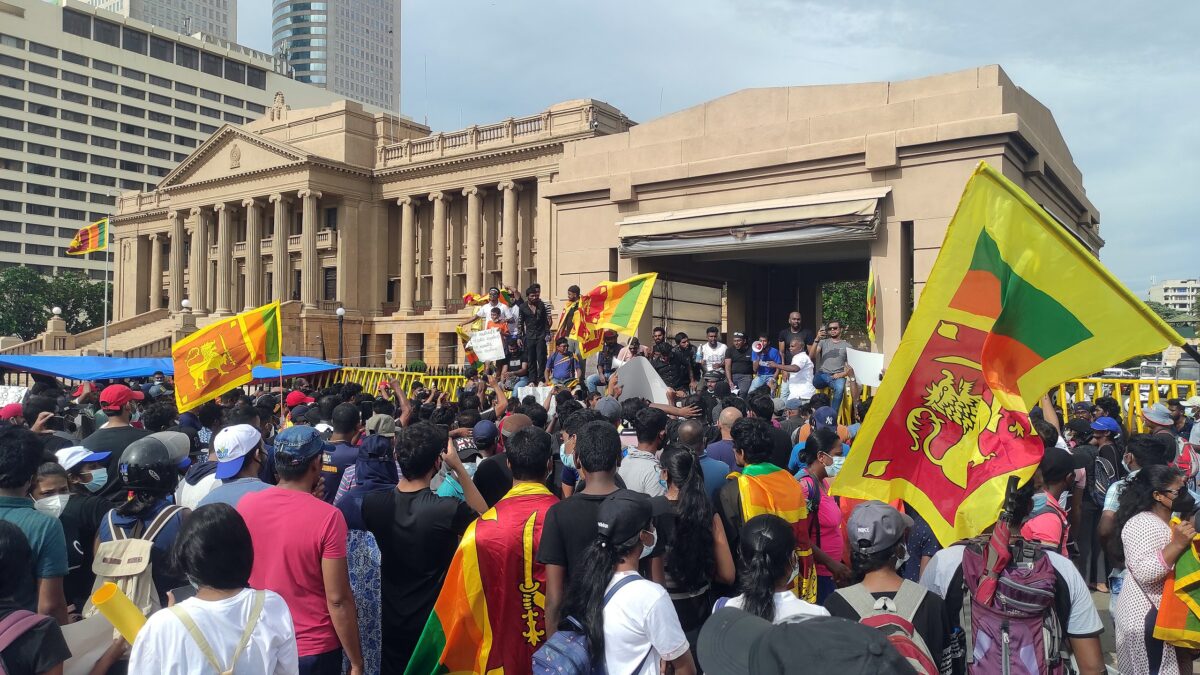
Protests against President Gotabaya Rajapaksa near the Presidential Secretariat (2022). Image via Wikimedia Commons by AntanO. CC BY-SA 4.0.
Sri Lanka published a new Anti-Terrorism Act (ATA) on March 22, 2023, which is set to be presented in parliament on April 25, 2023. However, there is a growing dissent within Sri Lanka against this proposed legislation, which is intended to replace the existing Prevention of Terrorism Act (PTA) and the accompanying bill.
Experts say that in the new law, the definition of terrorism is not precise and includes a broad range of offences that are already covered by existing criminal laws. Additionally, the law grants law enforcement agencies the unchecked power to detain individuals without warrants and provides sweeping powers to the President, police, and military to arbitrarily ban gatherings and organizations without adequate judicial oversight.
Some rights groups say the law is intended to curb dissent and protests:
The timing of the introduction of the ATA is worrisome as the #government has been using physical force and misusing existing #antiterrorismlaws to #suppress political opposition and limit citizens’ #rightstoprotest and assemble. This is a serious concern for #humanrights. pic.twitter.com/7ev57TdtCl
— CPA Sri Lanka (@CPASL) April 7, 2023
As per Human Rights Watch, the bill permits systematic violations of rights, stifling of peaceful dissent, and targeting of minority groups.
More draconian than previous laws
The proposed law is set to replace the Prevention of Terrorism Act, which was enacted in 1978 and widely employed to detain and torture minority communities, particularly the Tamils and Muslims. The Sinhalese, the majority of whom are Buddhist, constitute around 75 percent of the country’s population. There are discriminatory laws against other minorities, such as Tamils (around 15 percent) and Muslims (around 10%). The previous law was also utilized as a tool to suppress the Tamil insurgency during the Sri Lankan civil war that took place from 1983–2009.
Lawyer Gehan Gunatilleke posted a thread explaining how the proposed law could potentially facilitate authoritarianism.
A thread on the new Anti-Terrorism Bill in #lka.
There are two forms of authoritarianism.
The first is the explicit, overt, aggressive form witnessed throughout SL's post-independence history. This form of authoritarianism defined politics in the 1980s, 90s and 2000s.
1/— Gehan Gunatilleke (@GehanDG) April 4, 2023
The new act was first introduced in 2018 when the current president Ranil Wickremesinghe was the prime Minister, but it was not enacted into law due to widespread apprehension about its potential impact on human rights and democracy.
Educator Kalana Senaratne at citizen journalism site Groundviews says certain clauses in the new act categorize political protests and agitations as terrorism.
Human rights activist Ermiza Tegal, in her article for Groundviews, states that these new laws could serve as a formidable tool to help the government suppress dissent, citizen protests, and political opposition and enable the state to allocate massive responses against acts of civil disobedience.
In a separate op-ed published in the Daily FT, Ameer Ali warned that the proposed law could potentially quell protests like the Aragalaya (Struggle), which were mass protests against the Sri Lankan government during March–August 2022 that ultimately led to the downfall of the Rajapaksa regime. Ali further emphasizes that when peaceful avenues for change are not allowed, it could inevitably lead to violence.
Read our special coverage: Sri Lanka in crisis
Facing extensive criticism, Justice Minister Wijeyadasa Rajapakshe has stated that the government will adhere to the observations made by the Supreme Court regarding the proposed Anti-Terrorism Act (ATA), even as various groups are calling for the repeal of the new law.
Activist Thyagi Ruwanpathirana took to Twitter to highlight the protest of the opposition party Sri Lankan Podujana Peramuna (SLPP):
We are firmly of the opinion that there should be some limitations when defining terrorism in this bill. If the act allows for any action to be interpreted as an act of terrorism, it would not be suitable for a democratic society – SLPP on the ATA https://t.co/tFFffuSqHF
— Thyagi Ruwanpathirana (@ThyagiR) April 13, 2023
Cardinal Malcolm Ranjith of Colombo has expressed concerns, stating that the new anti-terrorism law is intended to stifle critics and suppress people's protests.
Human Rights Lawyer Bhavani Fonseka tweeted:
Increasing opposition to the #ATA with over 450 individuals/orgs call for the immediate withdrawal of the ATA
Anti-Terrorism Act, that is to replace the PTA, is an even more serious threat to democracy https://t.co/p0PT4lygAn #SriLanka @EmDeeS11
— Bhavani Fonseka (@bfonseka) April 11, 2023
Fonseka also shares some of the cartoons depicting the law:
Cartoons best capture the reality of the #ATA #RepealPTA #NotoATA #SriLanka pic.twitter.com/epC7UuCjpS
— Bhavani Fonseka (@bfonseka) April 10, 2023



